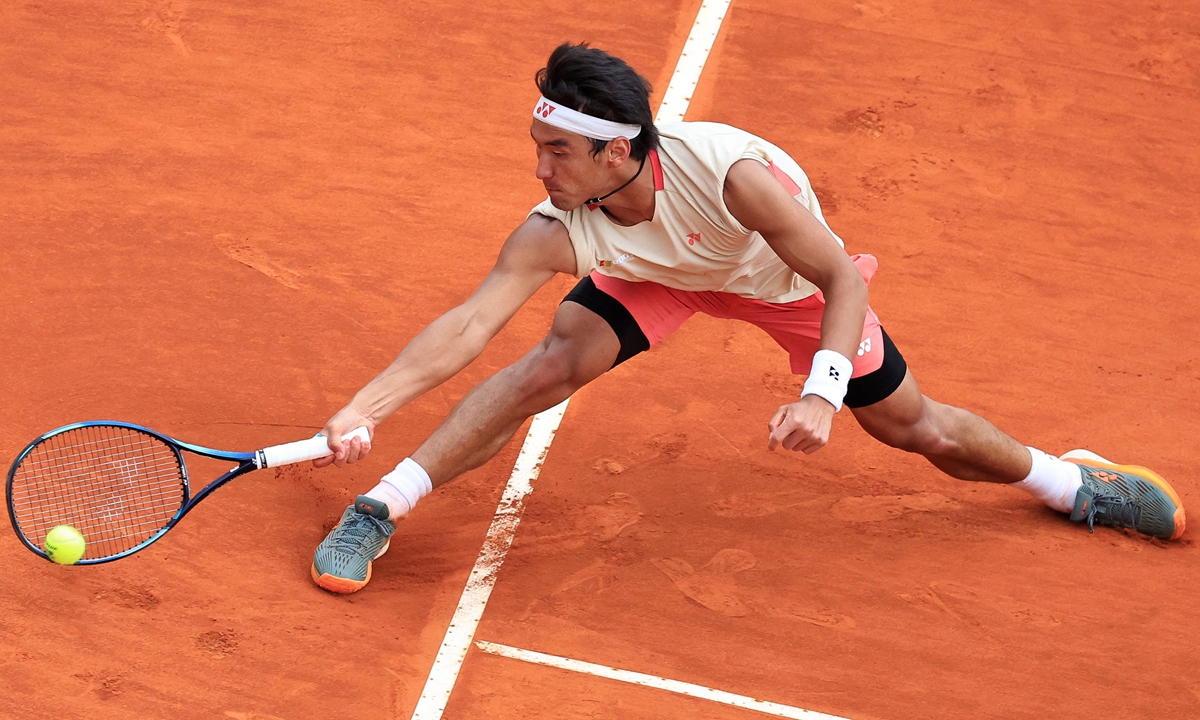Bu Yunchaokete hits a forehand return during a match on April 7, 2025. Photo: VCG
As the Wimbledon Championships approaches, Chinese tennis fans are hoping domestic players achieve some inspiring results, including 23-year-old Bu Yunchaokete, who is playing his maiden Wimbledon main draw competition this year.
Bu, currently world No.71 in the ATP singles rankings, the top male player from China, will eye a breakthrough in the Grand Slam. He is scheduled to start this year’s Wimbledon by taking on No.29 seed Brandon Nakashima on Tuesday.
Unlike 2024 when China’s Zhang Zhizhen and Shang Juncheng both made it to the second round while Bu suffered a qualification exit at Wimbledon, this year both Zhang and Shang skipped the Grand Slam due to injury.
“Indeed, it feels different as I don’t see them around, but I follow my own rhythm, with high-intensity training and work daily, and embrace what comes,” Bu told the Global Times in a recent interview.
Yet, far more than achieving results, it’s his journey – from the remote Uyghur-Mongol region of Xinjiang to the manicured lawns that captivates.
Bu was born in the Bortala Mongolian Autonomous Prefecture, Northwest China’s Xinjiang Uygur Autonomous Region in 2002. At the age of 5, he was picked by a tennis coach, leaving the SOS Children’s Village in Urumqi for East China’s Zhejiang Province to play tennis.
By 2011, he had joined the Zhejiang’s provincial tennis team. Over the next decade, Bu’s dedication in junior tournaments would lay the groundwork for his professional aspirations, as he steadily climbed the ITF junior rankings and earned opportunities to compete internationally.
By the time he turned professional in 2021, Bu had already gained a reputation for discipline and a powerful, aggressive baseline game.
His two-handed backhand and serve, both honed on hard and clay courts, would later become weapons on grass as well – despite grass being a less familiar surface for many Chinese players.
His growth in 2024 was also widely celebrated, especially his semifinal runs at home ATP events in Hangzhou, East China’s Zhejiang Province and the China Open in Beijing where he stunned then fourth seed Andrey Rublev en route.
Jannik Sinner, current men’s tennis world No.1, also hailed the tenacity of Bu after the duo met in the China Open semifinals where he defeated Bu 6-3, 7-6 (7/3). Sinner called it “a very tough and tricky match.”
Climb up
In April 2025, Bu reached his career-high ATP singles ranking of No.64 after finishing the ATP Turin Challenge event as the runner-up, a step closer to his goal for this year: To make into the top 50.
This newfound status granted him direct acceptance into Grand Slam main draws, including his maiden Wimbledon appearance.
Bu entered the 2025 grass-court season with optimism tempered by the recognition that grass demands unique timing, footwork and adaptability.
His preparation included back-to-back qualifying efforts at the Queen’s Club Championships and the Mallorca Open.
“During the first week at the Queen’s qualifiers I was fairly satisfied, but the second week was me paying my dues as a newcomer,” Bu reflected to the Global Times on his buildup to the Wimbledon Championships.
“I entered Eastbourne qualifying and Mallorca main draw, training in London until Friday, then flew there, only to find that the grass was completely different from London’s, and that week was a bit too rushed,” he said.
Despite his high level of fitness, the whirlwind travel schedule took its toll. Bu lost two matches in Queen’s qualifying and another in Mallorca’s first round, conceding that the “travelling toll” impacted his performance.
“I felt a bit fatigued that week, which led to some subpar performance. But this is part of professional tennis life, so I have to overcome it,” he said.
Nevertheless, Bu used the travails as a learning experience. He returned to London for a week of intensive practice on grass courts, focusing on adapting his serve-and-volley transition and improving slice backhands to keep the ball low on the slick surface.
“Although I haven’t participated in too many matches on grass courts, I’m still very satisfied with my training,” he noted, emphasizing that training quality can be as important as match play.
The rigors of tour life — long flights, shifting time zones, and relentless competition, bring inevitable physical and mental strain. When asked about injury prevention and recovery, Bu highlighted the role of communication and teamwork.
“First, it’s about your training load and tight communication with the coach, knowing how much your body can handle each day… Also, my team includes a therapist who regularly looks after my body, so I think right now it’s all still pretty good.”
Mentality matters
Elite tennis often comes down to the mind. Bu is acutely aware of this, both in match moments and recovery, though his buildup toward Wimbledon is a distance away from satisfying. His guiding principle: Belief in hard work and routine, with grace in adversity.
“First, you need to trust yourself and your daily work. If you can affirm it, it’s easier to digest the pressure… sometimes you feel tired, then you just need to take reasonable breaks,” he said.
Such mental conditioning has underpinned Bu’s steady climb: From his first Grand Slam main-draw appearance via qualifying at the 2024 US Open to now preparing for his fourth straight major appearance at Wimbledon.
He told the Global Times that perseverance is fundamental in professional tennis.
“In professional tennis, perseverance is fundamental. Nothing comes easily, even if the results don’t immediately match your efforts, trust that the rewards will come,” he said.
Discussing the challenges of the tour, he explained that the travel, competition and pressure to defend points could always bring anxiety. “But you must learn to enjoy the process,” he emphasized.
